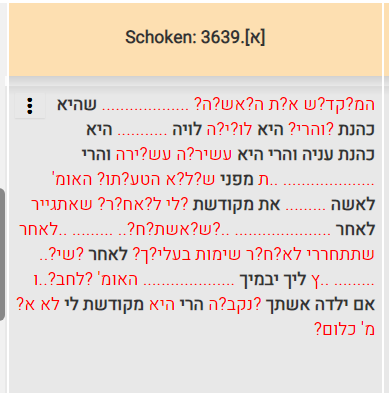Brackets and Parentheses
In the Mishna on yesterday’s daf (Kiddushin 62a):
The last sentence of the Mishnah, talking about if his fellow’s wife is pregnant, is placed in parentheses. As is well known, parentheses mean take it out, while square brackets mean put it in.
Rabbi Yeshayahu Pick, in his Masoret Hashas commentary, explains that this sentence corresponds to the position of Rav Chanina on the next amud. It does not make sense to have it explicitly in the Mishnah.
Thus:
כְּמַאן אָזְלָא הָא דְּתַנְיָא: הָאוֹמֵר לַחֲבֵרוֹ ״אִם יָלְדָה אִשְׁתְּךָ נְקֵבָה, מְקוּדֶּשֶׁת לִי״ – לֹא אָמַר כְּלוּם. וְאָמַר רַבִּי חֲנִינָא: לֹא שָׁנוּ אֶלָּא שֶׁאֵין אִשְׁתּוֹ מְעוּבֶּרֶת, אֲבָל אִשְׁתּוֹ מְעוּבֶּרֶת – דְּבָרָיו קַיָּימִין. כְּמַאן? אִי כְּרַבָּה כְּשֶׁהוּכַּר עוּבָּרָהּ, אִי כְּרַב יוֹסֵף – אַף עַל פִּי שֶׁלֹּא הוּכַּר עוּבָּרָהּ.
§ The Gemara asks: In accordance with whose opinion is that which is taught in the following baraita: With regard to one who says to another: If your wife gives birth to a female she is betrothed to me, he has not said anything? And Rabbi Ḥanina says: They taught this halakha only in a case where the other’s wife is not pregnant. But if his wife is pregnant his statement is upheld. In accordance with whose opinion is this ruling? The Gemara answers: The baraita can be explained in accordance with everyone’s opinion. If it is in accordance with the opinion of Rabba, it is referring to a situation where her fetus was already noticeable, just as the stalks of fodder are recognizable. If it is in accordance with the opinion of Rav Yosef, the halakha of the baraita applies even if her fetus was not yet noticeable.
Indeed, looking at manuscripts and printings other than the Vilna Shas, we don’t see this sentence. Thus, the printings:
The manuscripts as well, except that they all end לא אמר כלום:
We lost that, even though we do get rid of the parenthesized sentence.
This might also play into what R’ Chanina is commenting upon above. Is it a brayta or a Mishnah? Most texts have תניא indicating a brayta, but Vatican 110-111 has תנן, indicating a Mishnah. The quote from that text includes the conclusion of לֹא אָמַר כְּלוּם.
Busy week, so that’s all for today.





